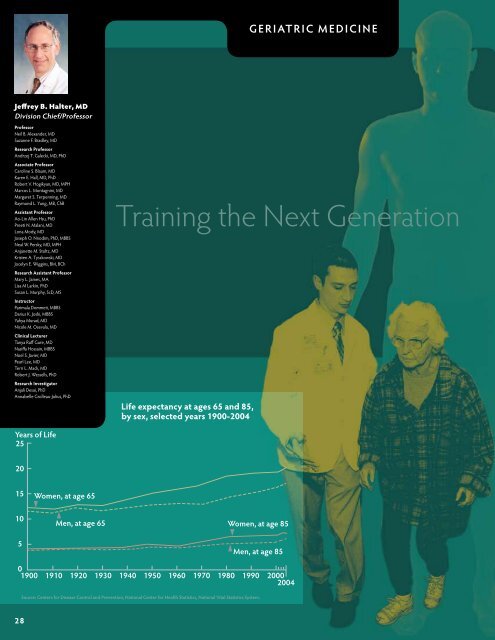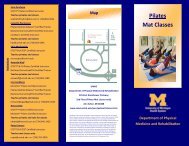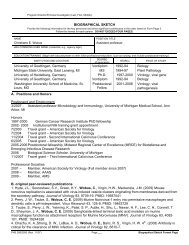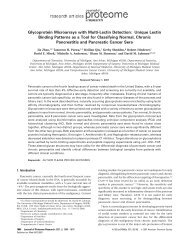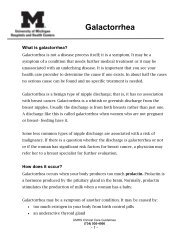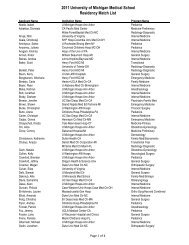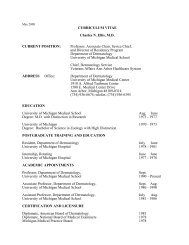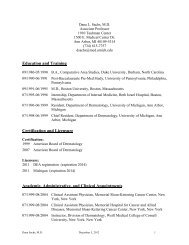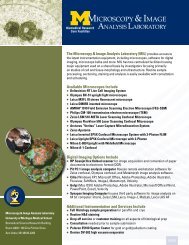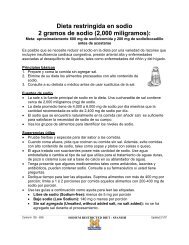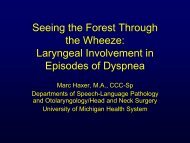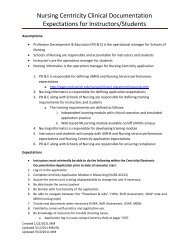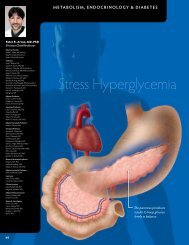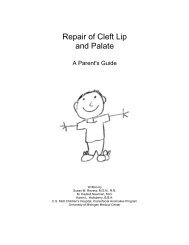Training the Next Generation - University of Michigan Health System
Training the Next Generation - University of Michigan Health System
Training the Next Generation - University of Michigan Health System
You also want an ePaper? Increase the reach of your titles
YUMPU automatically turns print PDFs into web optimized ePapers that Google loves.
Jeffrey B. Halter, MD<br />
division Chief/pr<strong>of</strong>essor<br />
Pr<strong>of</strong>essor<br />
neil B. alexander, MD<br />
Suzanne F. Bradley, MD<br />
Research Pr<strong>of</strong>essor<br />
andrzej T. galecki, MD, PhD<br />
Associate Pr<strong>of</strong>essor<br />
Caroline S. Blaum, MD<br />
karen e. hall, MD, PhD<br />
Robert V. hogikyan, MD, MPh<br />
Marcos l. Montagnini, MD<br />
Margaret S. Terpenning, MD<br />
Raymond l. yung, MB, ChB<br />
Assistant Pr<strong>of</strong>essor<br />
ao-lin allen hsu, PhD<br />
Preeti n. Malani, MD<br />
lona Mody, MD<br />
Joseph o. nnodim, PhD, MBBS<br />
neal W. Persky, MD, MPh<br />
anjanette M. Stoltz, MD<br />
kristen a. Tyszkowski, MD<br />
Jocelyn e. Wiggins, BM, BCh<br />
Research Assistant Pr<strong>of</strong>essor<br />
Mary l. James, Ma<br />
lisa M larkin, PhD<br />
Susan l. Murphy, ScD, MS<br />
Instructor<br />
Parimala Dommeti, MBBS<br />
Darius k. Joshi, MBBS<br />
yahya Murad, MD<br />
nicole M. osevala, MD<br />
Clinical Lecturer<br />
Tanya Ruff gure, MD<br />
nasiffa hossain, MBBS<br />
noel S. Javier, MD<br />
Pearl lee, MD<br />
Terri l. Mack, MD<br />
Robert J. Wessells, PhD<br />
Research Investigator<br />
anjali Desai, PhD<br />
annabelle grolleau-Julius, PhD<br />
years <strong>of</strong> life<br />
25<br />
20<br />
15<br />
10<br />
5<br />
28<br />
Women, at age 65<br />
men, at age 65<br />
source: Centers for disease Control and prevention, national Center for <strong>Health</strong> statistics, national Vital statistics system.<br />
GeriatriC mediCine<br />
<strong>Training</strong> <strong>the</strong> <strong>Next</strong> <strong>Generation</strong><br />
Life expectancy at ages 65 and 85,<br />
by sex, selected years 1900-2004<br />
Women, at age 85<br />
men, at age 85<br />
0<br />
1900 1910 1920 1930 1940 1950 1960 1970 1980 1990 2000<br />
2004
By <strong>the</strong> year 2050, more than 20 percent <strong>of</strong> <strong>the</strong> U.S. population<br />
is projected to be above <strong>the</strong> age <strong>of</strong> 65. The aging<br />
population is not only growing, but living longer than ever<br />
before, calling for additional and specially trained physicians.<br />
By <strong>the</strong> age <strong>of</strong> 75, <strong>the</strong> average American lives with two or<br />
three chronic medical conditions, some with several more,<br />
according to <strong>the</strong> American Geriatrics Society (AGS). In addition<br />
to needing management <strong>of</strong> care for chronic illnesses,<br />
aging populations have unique preventive care needs, and<br />
additional social, psychological and environmental factors<br />
also come into play.<br />
Unfortunately, <strong>the</strong>re is a shortage <strong>of</strong> physicians who specialize<br />
in geriatric consultative, primary and end-<strong>of</strong>-life care. The Division<br />
<strong>of</strong> Geriatric Medicine is working to ensure its fellowship<br />
trainees are well schooled in all approaches to and philosophies<br />
<strong>of</strong> caring for <strong>the</strong>ir aging patients.<br />
Hospice and Palliative Medicine Fellowship<br />
The Division <strong>of</strong> Geriatric Medicine has established a new oneyear<br />
Hospice and Palliative Medicine Fellowship program.<br />
The goal <strong>of</strong> which is to “promote excellence in hospice and<br />
palliative medicine education through <strong>the</strong> provision <strong>of</strong> a<br />
variety <strong>of</strong> clinical educational and research experiences in <strong>the</strong><br />
field,” says Marcos Montagnini, MD, fellowship program director.<br />
Dr. Montagnini completed his own fellowship training<br />
in geriatric medicine at U-M in 1998 and went on to develop<br />
a palliative care program in <strong>the</strong> Division <strong>of</strong> Geriatric Medicine<br />
at <strong>the</strong> Medical College <strong>of</strong> Wisconsin. He returned to U-M in<br />
2007 to develop <strong>the</strong> palliative care fellowship program here,<br />
and to lead <strong>the</strong> palliative care program at <strong>the</strong> VA Ann Arbor<br />
<strong>Health</strong>care <strong>System</strong>.<br />
Funding for <strong>the</strong> new program was awarded by <strong>the</strong> VA’s<br />
Office <strong>of</strong> Academic Affiliations through a highly competitive<br />
process. The support is ongoing and supports positions for<br />
two fellows each year.<br />
The comprehensive and multidisciplinary<br />
curriculum covers pain management and<br />
symptom control at <strong>the</strong> end <strong>of</strong> life as well<br />
as assistance in many o<strong>the</strong>r areas, including<br />
psychosocial and spiritual support,<br />
bereavement support for families, control<br />
<strong>of</strong> complications and co-morbidities that<br />
can cause life-threatening illnesses and<br />
optimizing function for quality <strong>of</strong> life.<br />
Fellows design and complete a scholarly<br />
research project with mentorship. Those<br />
who choose to pursue <strong>the</strong>ir research can<br />
continue <strong>the</strong>ir work during a second year.<br />
One former fellow designed and conducted<br />
a survey <strong>of</strong> some 200 geriatric<br />
patients assessing attitudes about hospice<br />
From left to Right: Drs. noel Javier,<br />
erin Diviney-Chun, Marcos Montagnini,<br />
and Brandon Walters<br />
and palliative care. Patients are <strong>of</strong>ten referred to palliative and<br />
hospice services very late in <strong>the</strong> disease process, explains Dr.<br />
Montagnini, so such services are underutilized. The data is still<br />
being analyzed but should yield new insights into patient—<br />
and physician—barriers to seeking <strong>the</strong>se types <strong>of</strong> care.<br />
During <strong>the</strong>ir fellowship year, trainees rotate through <strong>the</strong> VA<br />
Ann Arbor <strong>Health</strong>care <strong>System</strong>, <strong>University</strong> Hospital, Mott<br />
Children’s Hospital and Arbor Hospice, a community-based<br />
hospice care facility. The VA rotation includes palliative care<br />
consultations for inpatients, outpatients and those receiving<br />
home-based care. Fellows work closely with faculty from<br />
numerous disciplines, including internal medicine, oncology,<br />
nephrology, geriatrics, surgery, family medicine, pediatrics,<br />
social work, psychology, and chaplaincy to hone <strong>the</strong>ir clinical<br />
and leadership skills. “It’s an innovative program,” says Dr.<br />
Montagnini, “because <strong>of</strong> its multidisciplinary nature and <strong>the</strong><br />
range <strong>of</strong> passionate faculty and preceptors who are leaders<br />
in <strong>the</strong>ir fields.” Fellows may go on to start a palliative care<br />
program at a hospital or health system or lead a hospice care<br />
program. O<strong>the</strong>rs may pursue additional training for academic<br />
research careers.<br />
The division strongly supports <strong>the</strong> new program. “We need<br />
to have more physicians prepared to care for patients who<br />
have life limiting illness,” says Dr. Montagnini, “and to understand<br />
<strong>the</strong> significant needs <strong>of</strong> <strong>the</strong>ir families as well. Several<br />
studies show a lack <strong>of</strong> physician preparedness for end-<strong>of</strong>-life<br />
care. Our goal is to address this gap.”<br />
Although <strong>the</strong> program is young, it has already attracted<br />
high-quality applicants. Current and former fellows will<br />
present three posters at <strong>the</strong> 2009 assembly <strong>of</strong> <strong>the</strong> American<br />
Academy <strong>of</strong> Hospice and Palliative Medicine.<br />
The U-M Hospice and Palliative Medicine Fellowship program<br />
is in <strong>the</strong> first cohort, nationally, to receive accreditation by <strong>the</strong><br />
Accreditation Council for Graduate Medical Education.<br />
GERIATRIC MEDICINE<br />
Department <strong>of</strong> Internal Medicine 2008 Annual Report • 29
30<br />
Geriatric Medicine Fellowship<br />
The division also has supported a fellowship program in geriatric<br />
medicine since <strong>the</strong> 1980s. Division Chief, Jeffrey Halter, MD,<br />
led <strong>the</strong> program until 2002 (see sidebar). “Fellows have an extremely<br />
busy clinical year,” says Robert Hogikyan, MD, MPH,<br />
current fellowship program director.<br />
Trainees come from family medicine, internal medicine and a<br />
variety <strong>of</strong> o<strong>the</strong>r disciplines. They complete several rotations<br />
during <strong>the</strong>ir fellowship year, including gaining clinical experience<br />
in institutional long-term care at one <strong>of</strong> two community<br />
facilities. They provide geriatric medicine consultations at both<br />
<strong>the</strong> <strong>University</strong> and VA hospitals, and <strong>the</strong>y receive training in<br />
hospice and palliative medicine through <strong>the</strong> VA hospital and<br />
Arbor Hospice. They also spend two months rotating through<br />
several sub-specialty clinics <strong>of</strong> <strong>the</strong> Geriatrics Center, including<br />
those focused on geropsychiatry, mobility and dementia care. A<br />
once monthly Geriatric Research Education and Clinical Center<br />
conference gives fellows a deeper understanding <strong>of</strong> topics<br />
related to physical medicine and rehabilitation, with interdisciplinary<br />
team presentations on numerous topics.<br />
Research projects are encouraged, and fellows may pursue<br />
advanced training in <strong>the</strong> form <strong>of</strong> a second or even third year<br />
devoted to research. Some go on to additional training in subspecialty<br />
areas such as oncology.<br />
How fellows are evaluated and get feedback has evolved,<br />
particularly over <strong>the</strong> past year, says Dr. Hogikyan. In addition to<br />
traditional faculty evaluations, fellows receive input about <strong>the</strong>ir<br />
performance from patient satisfaction surveys and from nursing<br />
and administrative staff in <strong>the</strong> clinics through which <strong>the</strong>y rotate.<br />
Specialized patient instructors, who<br />
are specially trained older adults,<br />
provide input from patients’ perspective<br />
as well.<br />
The entire experience adds up to<br />
compassionate, knowledgeable<br />
and experienced physicians: “It<br />
takes a certain type <strong>of</strong> person,”<br />
says Dr. Hogikyan. “The person<br />
who chooses geriatric medicine<br />
has to enjoy working with older<br />
adults and with chronic illness<br />
and takes reward and reinforcement<br />
from those interactions. It<br />
takes a certain focus, one I think<br />
our trainees over <strong>the</strong> years have<br />
demonstrated with excellence.”<br />
left to Right: Drs. Ji Won yoo,<br />
Denise Flinn, erin Diviney-Chun,<br />
and Robert hogikyan
Jeffrey Halter, MD, Honored by <strong>the</strong> American<br />
Geriatrics Society<br />
Jeffrey Halter, MD, director <strong>of</strong> <strong>the</strong> <strong>University</strong> <strong>of</strong> <strong>Michigan</strong><br />
Geriatrics Center and Institute <strong>of</strong> Gerontology, was honored<br />
this year with <strong>the</strong> Nascher/Manning Award by <strong>the</strong> American<br />
Geriatrics Society. This prestigious and coveted award was<br />
presented at <strong>the</strong> society’s annual meeting, held in Washington,<br />
DC in May.<br />
Established in 1987, <strong>the</strong> award honors Ignatz Leo Nascher,<br />
MD (1863-1944), an advocate for older adults who believed<br />
that medical care <strong>of</strong> <strong>the</strong> aged should be treated as a distinct<br />
specialty. He is credited with coining <strong>the</strong> term “geriatrics.”<br />
The Nascher/Manning Award is bestowed upon an individual<br />
who has demonstrated lifelong and distinguished achievement<br />
in <strong>the</strong> field <strong>of</strong> clinical geriatrics. Dr. Halter was chosen<br />
for his accomplishments and contributions as a “leader in <strong>the</strong><br />
field <strong>of</strong> geriatrics, an educator and an author,” in addition to<br />
possessing “outstanding qualities and skills <strong>the</strong> society wishes<br />
to honor.”<br />
Dr. Halter specializes in <strong>the</strong> treatment <strong>of</strong> diabetes in older<br />
adults. His research focuses on neuroendocrine regulation <strong>of</strong><br />
metabolism in aging and in diabetes. He has published more<br />
than 250 research papers and book chapters and served as<br />
senior editor for <strong>the</strong> 6th edition <strong>of</strong> Hazzard’s Geriatric Medicine<br />
and Gerontology (McGraw-Hill).<br />
Dr. Halter has also shown tremendous leadership by directing<br />
<strong>the</strong> U-M Geriatrics Center, a collaborative initiative among<br />
12 schools and institutes and 178 faculty to advance research<br />
into <strong>the</strong> health and healthcare issues <strong>of</strong> older adults and to<br />
provide top-notch clinical care. He<br />
has also successfully led <strong>the</strong> <strong>University</strong>’s<br />
Institute <strong>of</strong> Gerontology, a hub<br />
<strong>of</strong> gerontological research, including<br />
many large multidisciplinary projects.<br />
In 2004 he oversaw <strong>the</strong> merger <strong>of</strong><br />
<strong>the</strong> Geriatrics Center with <strong>the</strong> Institute<br />
in order to streng<strong>the</strong>n geriatricsand<br />
aging-related work throughout<br />
<strong>the</strong> <strong>University</strong>. The clinical, research<br />
and training programs in geriatrics at<br />
U-M have been consistently ranked<br />
among <strong>the</strong> best in <strong>the</strong> United States.<br />
geriatrics Center Director<br />
Jeffrey halter, MD<br />
Department <strong>of</strong> Internal Medicine 2008 Annual Report • 31


